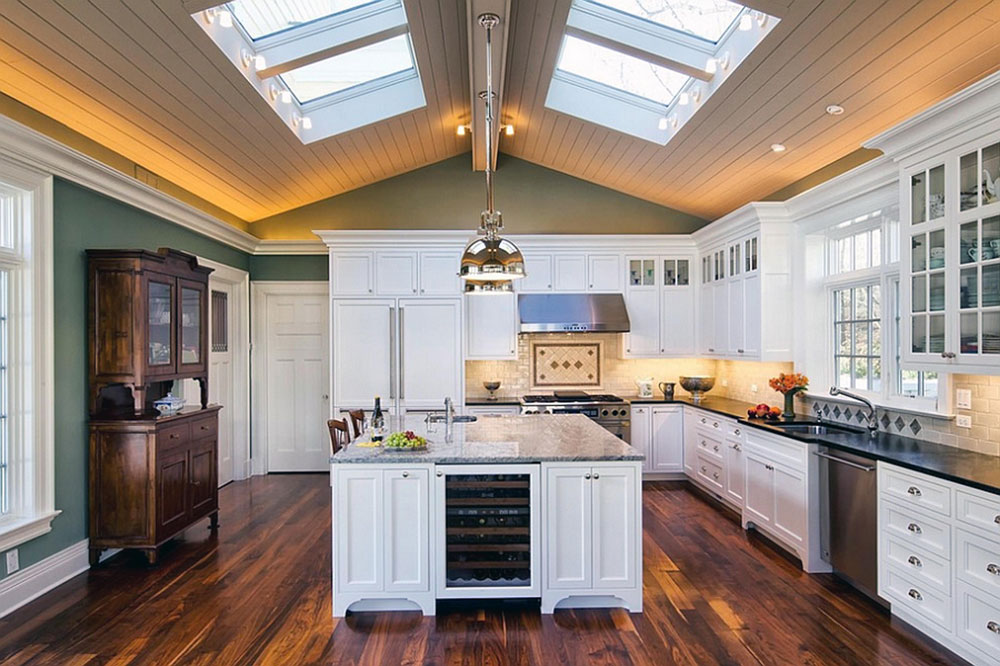12:32 PM Bring In Natural Light With A Skylight |
In recent years, installing skylights has been one of the most common choices for naturally lighting any part of the home. Indeed, they allow owners to enjoy a beautiful view of the sky (day or night) while reducing the use of more traditional lighting during the day. To bring natural light into a blind room, there is a solution: the skylight. How does this system work? What are the disadvantages and advantages? Here are some answers: What is a skylight?
It brings natural light where it is impossible to create a window. His technique is quite simple:
An opening on the roof catches outside light. This opening is surmounted by a dome (like a bubble) which concentrates the light inside a rigid conduit.
The light is then transported inside the duct lined with reflecting mirrors. The reflective pipe can be bent to bring the light to a specific location in the house.
An acrylic or polycarbonate diffuser then makes it possible to redistribute the light inside the blind rooms.
As windows and doors, this type of device is part of the family of interior carpentry elements. The craftsmen responsible for its installation must take into account the waterproofing and thermal insulation.
One other good aspect is that roof skylights do not cost a lot of money. You can easily afford them. You can easily discuss prices for roof skylights in Cape Town at https://rooflites.co.za. Do skylights only have qualities?
When skylights were originally touted as a source of natural light for the home, many people saw them as a way to save on energy costs. And while there are some that save you energy, that doesn't mean all skylights save you money. In fact, some can cost you more for different reasons!
So, if you are planning to install skylights in your home, take a few moments to consider the various advantages and disadvantages of skylights. The advantages of a skylight
Its main advantage is to bring natural light where it is lacking, in other words in blind rooms (dressing room, stairwell, hallway, etc.).
The fact that the light is concentrated makes it possible to obtain, at the exit of the well, an intense light as in broad daylight, which makes it possible to save energy. Even at night, the prism of the dome captures the light of the moon and the stars!
Its installation is financially accessible. It brings real comfort to everyday life for years.
Installing skylights is a good idea if your desire is to improve the aesthetics of your home. They will provide an impressive amount of natural light while giving you an opening to the sky. And like many other architectural improvements, skylights can add value if your home eventually resells. Skylights can also provide natural ventilation, provided you have an articulated model.
You can then open the window to let air in. Skylights controlled by the remote control are the most comfortable because it becomes easy to quickly close the window if something unpleasant and coming from outside disturbs you (smell, rain or even noise). Did you know? Thanks to smart windows, you can even get skylights equipped with rain sensors that will close automatically in inclement weather. The disadvantages of a skylight
One of the best-kept secrets in the skylight world is the near absence of energy savings. And this is explained simply. Indeed, the rising heat, a skylight in the roof of a traditional house loses 35 to 45% more heat in cold weather than the same window installed on the side of the house. Also, when the heat reaches a cooler window, condensation forms, and you will see a few drops of water form.
Let's take a look at another downside to skylights: leaks. They are indeed responsible for a large number of leaks in the roof. Even if you are very rigorous about renovating and maintaining your roof, homeowners with skylights find that roofing problems such as leaks, seepage, or other damage are more likely to occur around roof shafts. light.
So the question is: are they a good idea for your home? The answer is an absolute yes! But are they ideal for all situations? Not necessarily. |
|
|
| Total comments: 0 | |
